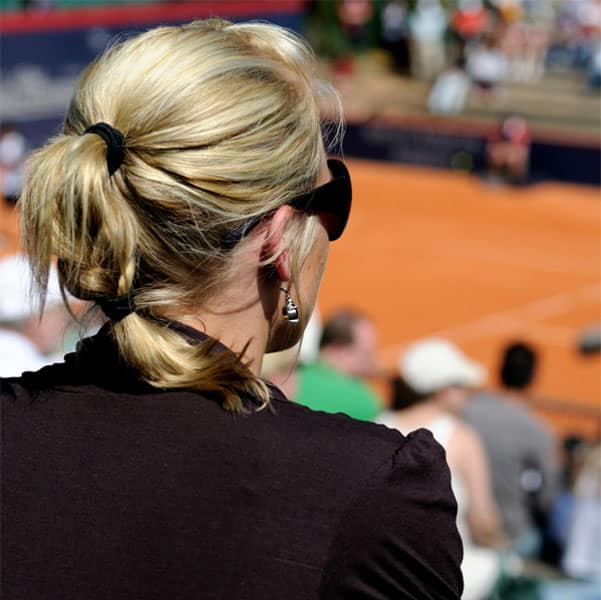
Beyond managing the post-match cauldron of emotions, parents will encounter a number of other times when how you interact with your child will be as important as what you do. This article will cover some of the key behaviours that can help develop your child into a strong, resilient and independent person.
Being supportive
Tennis is one of the most challenging sports when it comes to dealing with adversity and the range of intense emotions that come with it. It’s vital that parents lead with empathy before giving out advice to help increase their child’s self-esteem and to make them feel that they are understood. The best way for parents to approach this is to try to understand what their child is going through and to provide the appropriate levels of emotional support. The key is balance – it is equally detrimental to be either under supportive or over involved.
Reflect on what your motivations are regarding your child’s tennis. Parents who are in it to provide personal development opportunities for their child are more likely to promote enjoyment and increase long-term motivation, whereas parents whose primary motivation is for their child to become a professional tennis player often create a stressful environment that can lead to their child enjoying the game less. This can often result in their child leaving the sport altogether.
There are unfortunately many high-profile examples in Australia and around the world of tennis parents behaving poorly, being overbearing and not role modelling the appropriate behaviour. Consequently, their child suffers.
Be a role model
There is a well-known saying that actions speak louder than words, and this is definitely the case when it comes to parenting. Your child will listen to some of what you say while copying most of your actions and behaviours, and as a result will become similar to you in many ways when they’re a parent. To expect otherwise would be unrealistic. It is important that parents are great role models when it comes to taking responsibility for outcomes, working hard, providing calm responses to emotional situations while regulating determination and enjoyment of competition.
Encourage resilience
To be successful in anything in life, you need to be able to develop mental toughness and handle adversity. An important aspect here is to expose your child to challenging environments. This allows them to experience adversity and promotes opportunities for them to adapt, grow and become resilient.
A mistake that some parents make is being over protective and not providing enough opportunities for their child to work hard and over- come difficulties. This is likely to lead to the child becoming helpless when they’re facing adversity. Parents who operate on the tougher side of the spectrum allow their child to develop the ability to overcome tough situations on and off the tennis court.
Develop your child’s self-esteem and self-belief
It’s vitally important that parents communicate unconditional love and acceptance of their child, regardless of match outcomes or performance. This helps build the child’s self-esteem and results in them having a balanced approach to competition. Parents who communicate love conditionally on results will lower the self-esteem of their child and increase their anxiety levels.
Parent’s need to be encouraging and positive with a focus on competence along with the ability to achieve future goals. Consistent positive communication helps to increase your child’s self-belief and their ability to challenge themselves to go after the joy that comes with achieving. Parents who are negative and critical with regard to their child’s performances promote self-doubt and self-criticism. Expectations are another important element in building self confidence in your child. Parents who communicate high expectations encourage their child to develop the skills to overcome challenges.
It is important to strike a balance between the two extremes of communicating low expectations, which promote a lack of self-belief and drive to achieve, and unrealistically high expectations, which increase anxiety, continual frustration and disappointment with their performance.
Encourage decision making and independence
It’s important for your child to feel a level of autonomy and buy in when it comes to making decisions. Let them decide to play the game and excel in it because they love it. As a parent, you can encourage this, particularly if you have a love for the game yourself. Ultimately you want to make your child feel like they are in complete control of their destiny and are incredibly supported along the way.
Problem solving needs to be a regular part of your child’s development, so it’s important not to do the thinking for them. Encourage your child to solve problems and make decisions. Parents who do everything for their child or give them all the answers can promote helplessness.
Encourage autonomy at developmentally appropriate ages in conjunction with the balance of setting clear limits, boundaries and consequences for poor behaviour. When the child doesn’t meet certain standards, apply appropriate consequences consistently. This teaches a child that their actions are important and will guide appropriate behaviours and values.
Some watch-outs
Professional players with low values are unpopular and a poor role model for the next generation of kids looking up to them . Most of the time, their behaviours can be traced back to the style of tennis parenting they received throughout their childhood.
If you’d like your child to grow up as a happy, strong and confident individual who loves their elite tennis journey, avoid the following behaviours:
- Making no effort to understand what your child is going through emotionally and physically, and
consequently communicating with a lack of empathy - Spoiling or overprotecting your child and not providing enough challenging opportunities for them
to face and overcome adversity - Communicating love only when your child is doing well or winning
- Communicating negatively and pessimistically to your child with regard to their skills and abilities
- Communicating low expectations to your child
- Communicating unrealistically high expectations to your child
- Discouraging independence and making all the decisions for your child
- Being a poor role model and expecting your child to be different (the ‘do as I say and not as I do’
approach doesn’t work well)
Many tennis parents make considerable lifestyle sacrifices to give their child the best chance of becoming successful including dedicating a huge amount of time, energy and resource into getting their child to training and tournaments. It’s important parents also invest in understanding and implementing best-practice tennis parenting to help shape your child into a person you can be proud of.
References
Anthony Ross, Coaching Mentally Tough Tennis: Lessons from the trenches (2015)
By Ryan Henry, Managing Director of Voyager Tennis and Ex-Pro Tennis Player




